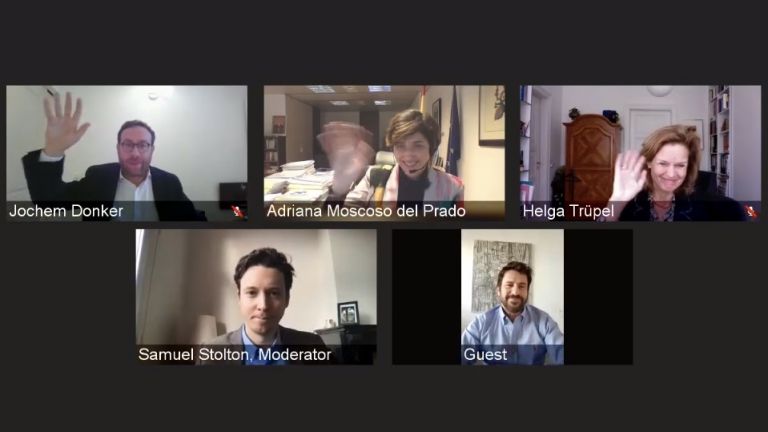Take-Aways from SAA Online Event on the Copyright Directive, Article 18

On 25 November 2020, the SAA organised its first online event of a series of conversation with filmmakers, members of the European Parliament, Member States’ representatives and experts on how making the most of the new Copyright Directive for next generation authors.
Starting with recorded filmmakers’ testimonies of Julie Bertuccelli (France), Urša Menart (Slovenia) and Roger Michell (UK), all insisted on the difficulty and the importance for screenwriters and directors to benefit from proportional remuneration.
The panel discussion moderated by Samuel Stolton, Digital Editor at EURACTIV, can be watched again here.
Helga Trüpel, former MEP, explained the efforts made by the European Parliament to introduce Article 18 on appropriate and proportionate remuneration of authors and performers to the Commission’s proposal and the compromise reached, which now puts the decision on the means to be developed to achieve this objective in the hands of national legislators.
Alexis Georgoulis, MEP and actor, confirmed the commitment of the European Parliament to monitor the implementation of the directive and explained how the work plan of the Cultural Creators Friendship Group of the European Parliament engages further in the problems faced by authors such as buyout contracts, working conditions and access to social rights.
See also the video message from the Cultural Creators Friendship Group delivered at the event, calling on the Member States to take action and implement Article 18 of the Copyright Directive.
Adriana Moscoso del Prado, representing the Spanish Ministry of Culture, showcased the long-established remuneration right audiovisual authors enjoy in Spain. Managed by the CMOs, it generates royalties to audiovisual authors for the exploitation of their works by broadcasters, retransmission operators and video-on-demand platforms.
Finally, Jochem Donker, General Counsel of LIRA, the Dutch CMO for writers, explained the long battle audiovisual authors faced, including in courts, to establish a right to remuneration for cable retransmission and the prospects of extending it to video-on-demand exploitation.
All emphasized the historic opportunity of the implementation of the Copyright Directive to adapt the audiovisual authors’ remuneration structure to fit modern day consumption of audiovisual works and help authors recover from the current difficult times.
Two steps for Member States to get it right for the next generation authors:
Step 1: Implement the principle of appropriate and proportionate remuneration of the Copyright Directive of Article 18 verbatim. It will form the legal basis for mechanisms aiming at ensuring remuneration to authors for the exploitation of their works.
Step 2: Establish an unwaivable and inalienable statutory remuneration right for audiovisual authors, upon transferring their exclusive rights to producers. It has to be written in the law that remuneration shall be paid by users and subject to collective management. This is the most effective mechanism to ensure remuneration to audiovisual authors, an urgent measure needed for booming video-on-demand exploitation.
By taking these 2-steps Member States will:
- Create a level playing field between audiovisual authors and global on-demand services that exploit their works, more than ever needed in this COVID-19 crisis.
- Avoid remuneration for the exploitation to be considered included in the fee paid by the producer for making the film (buy-out contracts). Contractual rules and possible collective bargaining agreements are positive but not sufficient enough to enforce such a rule to the benefit of all European authors.
- Place CMOs in a better position to negotiate appropriate and proportionate royalties for audiovisual authors with global players.
In countries where remuneration rights are already in place, such a solution adapts to the market and actual uses of audiovisual authors’ works. It does not add any cost on the financing and production of works nor to the state or public institutions’ budgets supporting the production and distribution of European works. The cost of the remuneration of the audiovisual authors for the exploitation of their works on-demand is borne by on-demand services and based on the revenues generated by their business.
For more information read Professor Raquel Xalabarder paper (2020) on the transposition of Article 18 and watch SAA video.
The Society of Audiovisual Authors is the association of European collective management organisations representing audiovisual authors. Its 33 members in 25 countries manage rights for 160,000 film, television and multimedia European screenwriters and directors.
